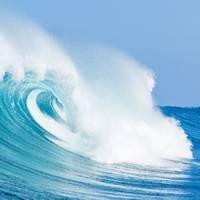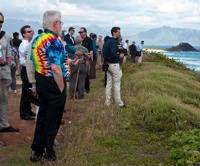Global Climate Change Threatens Papahānaumokuākea Marine
Despite its remote location in the Northwestern Hawaiian Islands, Papahānaumokuākea Marine National Monument faces a looming threat of global climate change that will affect its land and marine ecosystems, as well as its cultural resources, according to a new NOAA report. The Office of National Marine Sanctuaries Conservation Series report, Climate Change Vulnerability Assessment for the Papahānaumokuākea Marine National Monument, finds that sea-level rise, ocean acidification, ocean warming, and other climate-related changes are expected to significantly affect the monument. Projected sea-level rise, combined with likely increases in the strength of storms and ocean wave energy…
Wave Energy Conversion Competition Offers Cash Prize

Ricardo has been selected by the U.S. Department of Energy (DOE) Office of Energy Efficiency and Renewable Energy to administer a ocean Wave Energy Converter (WEC) prize challenge, aimed at helping to bring this potential source of clean energy to commercial scale. Wave energy conversion is technology that uses the motion of ocean waves to create electricity. The WEC Prize aims to attract innovative and next generation ideas from new and existing wave energy developers by offering a monetary prize and providing an opportunity for tank testing and evaluation of scaled WEC prototypes.
Modelling to Unlock the Potential of Wave Energy Farms
ARENA today announced $770,000 funding for Swinburne University of Technology to develop modelling on the performance of wave energy farms. The wave energy industry is emerging world-wide and there are few multiple device installations operating today. Predicting the best way to arrange future projects will help to better understand how different technologies will behave in certain circumstances. The modelling aims to discover the best ways of positioning wave arrays so that devices move in synergy with one-another, creating greater efficiencies. Swinburne is collaborating with interested Australian wave energy companies, which will sit on a project steering committee and have offered funding support and staff resources.
OWET Conference Program Announced
Oregon Wave Energy Trust (OWET) has announced the program for the eighth annual Ocean Renewable Energy Conference presented by the Northwest National Marine Renewable Energy Center (NNMREC). “Community and Industry: Collaboration, Innovation and Opportunity” is the theme of the event that takes place September 25-26, 2013 at the Liberty Theater in Astoria, Oregon. Over the past two years, Oregon has been engaged in a one-of-a-kind effort to plan for the development of ocean wave energy in our territorial seas. OWET has been proud to represent the wave energy industry and ensure that the territorial sea plan provides a flexible and reasonable plan for accommodating ocean energy.
Wave Power Generation – US Navy Hawaiian Project

The Navy hopes to expand its testing for ocean wave energy power generation in Hawaii, having been testing an energy buoy in about 100 feet of water off Marine Corps Base Hawaii in Kaneohe Bay for about 10 years. The Navy now hopes to put two more buoys in water more than 200 feet deep, and the greater depth will allow it to test larger devices closer to the size it needed to generate energy for customers. Bob Frederickson of the Naval Facilities Engineering Command said the new buoys are the next step toward commercializing wave energy.
SNAME Focused Panel Sessions, 2009 Meeting
The focused panel sessions at the Society of Naval Architects and Engineers (SNAME) Annual Meeting and Expo (October 21-23 at the Rhode Island Convention Center in Providence, Rhode Island) will feature four timely topics: Electric Ships; Renewable Energy from the Oceans; Unmanned and Autonomous Ships of the Future; and Ship Efficiency in the Greenhouse Gas Era. Each two-hour panel session will be chaired and moderated by experienced SNAME members. Each session will have three leading experts who will make thirty minute presentations on their area of expertise, followed by a moderated thirty minute discussion period which will include questions and answers from the audience.





